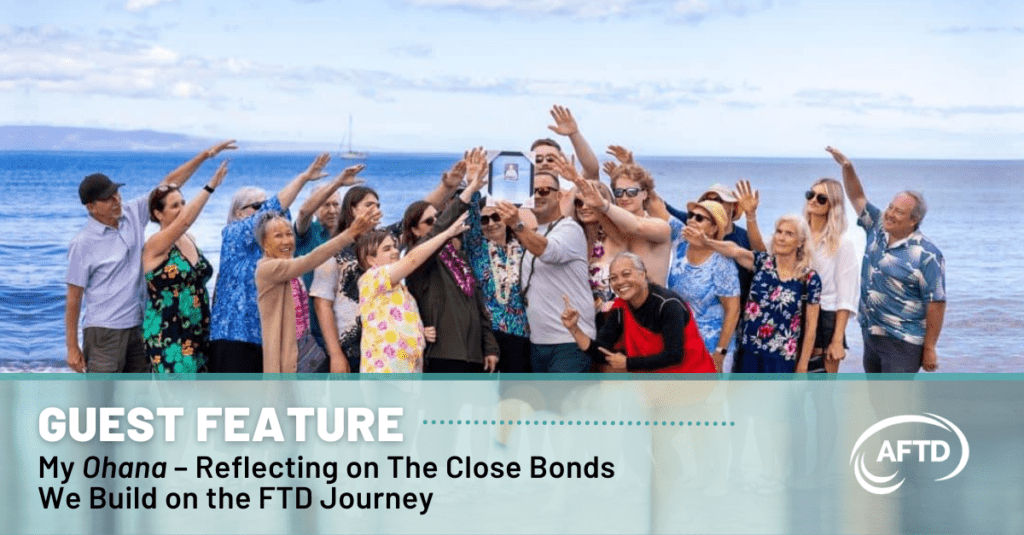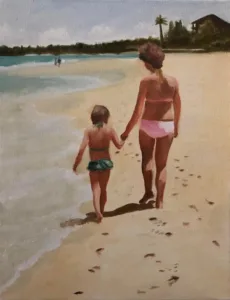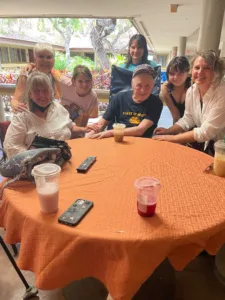Guest Feature: My Ohana – Reflecting on The Close Bonds We Build on the FTD Journey

FTD symptoms and the stigma attached can make navigating the disease an isolating experience for people diagnosed, care partners, and family. Support groups are a common way for people on the FTD journey to connect with others and share their experiences. However, as AFTD Ambassador for Oregon Melissa Fisher shares, connecting with people through these groups can pay off in ways you aren’t expecting.
“I don’t know what I would do without any of these people,” said Fisher. “I’m acutely aware that my father’s passing will be coming – but even then, I don’t feel alone. This chapter hasn’t closed – no matter how I feel, I know that I have all these people who care about me and are going to be there for me. We carry each other – it’s how I can carry on even when I don’t know when the journey will end.”
Her parents having moved to Hawaii 25 years ago, Fisher described her support network as an extended Ohana – the Hawaiian word for family. Fisher sat down with AFTD to share some recent experiences, highlighting how deep and meaningful the bonds created through support groups can become.
Healing Through Bonding
In July, Fisher and fellow group members Tom Christian and Scott Rose traveled to Maui to attend the memorial service of another group member Doreen’ s husband.
“It starts with FTD, but it doesn’t end there – we care about each other and look after one another,” said Fisher. “We come together from all across the country to support each other, to honor and remember our loved ones.”
During the trip, Fisher mentioned a childhood photograph of herself and her mother on Kahana Beach, which she had wanted to get painted for over two decades. Christian, who painted as a hobby and a form of therapy, offered to paint the photograph and declined payment.

“He said it would be his honor to make this dream of mine possible,” said Fisher. “I think it’s amazing the ways that we’ve found to support one another. We may have already found our natural talents, but our bonds allow us to apply them in a way that heals others and ourselves.”
A Relationship You Can’t Compare To
“I want to make sure that people recognize that the relationships forged in support groups are amazing; there’s nothing to compare it to,” Fisher said.
In some cases, the bonds made through groups can bring you support that you may not have realized you needed.
Earlier in August, fellow group member Erica Largent, whose late husband Larry was diagnosed with FTD and her family visited Hawaii on vacation and stayed near Lahaina. While returning from a day trip, Largent and her family found all the highways back to their resort cut off by authorities as recently sparked wildfires rapidly spread out of control. The fires spread so quickly that Fisher hadn’t heard many details about them when Largent reached out for help.
“I woke up to a private message on Facebook from Largent telling me that she hadn’t been able to get back to her resort,” Fisher said. “She said her parents had to sleep on metal benches in a church while she and her daughters slept in the car. That morning, they still couldn’t get back to their resort and didn’t know what to do.”
Fisher’s mind immediately turned to her mother, who lived on Maui but wasn’t at risk from the fires, and called to see if she could help. Her mother had barely woken up when she called.
“I said, ‘I want you to know that Lahaina is gone, the roads are closed, and my friends who I met through AFTD are trapped and need a place to go. Can you help?’” Melissa said. “Mom said, ‘Of course!’ Next thing she knows, Erica and her family show up on her doorstep tired and disheveled. Mom greeted them as warmly as she could; that’s the island way – she got them set up with beds, made them ‘hurricane tuna sandwiches’ using her hurricane provisions, and helped them get showered up.”
Fisher told AFTD that while it may have seemed like she and her mother were doing a favor for the Largents, it felt like they were doing a favor back for her. Fisher’s mother is diagnosed with Parkinson’s disease and lives alone in Maui as her father, who has FTD, resides in a long-term care facility. Suddenly, though, her mother was surrounded by the close friends Fisher had met through her AFTD support network.
Fisher’s mom called another friend who agreed to let the Largents stay at their nearby condo for the remainder of their vacation. The Largents invited Fisher’s mother to join them for dinner upon hearing that it was her birthday and Erica’s mother and mother-in-law and Melissa’s mother spent much of the evening sharing their lived experiences of FTD.
“My mom never had a support group, she never really had much access to resources like AFTD, she doesn’t really participate in social media,” Fisher said. “Imagine that you’re finally able to have conversations about your pain and what you’ve been through with your husband and having those conversations for the very first time with people who really understand. That was my mom’s first encounter with a family that had been impacted by FTD; before that, in all the years she was a care partner to my father, she never had anyone with lived experience to talk to.”
The next day, the Largent family asked to join her mother on her weekly visit with Fisher’s father. Fisher told AFTD that only she and her mother had visited her father before that day.
“To have a whole family come and meet my dad meant so much to me,” Fisher said. “Nobody has really met my father since this disease; this is the first time for almost three and a half years. To have that level of enthusiasm to meet my dad and get to know him, and to see the smiles in the pictures they sent me, it meant the world to me.”

Fisher is so grateful for the bond that formed between the families. “I couldn’t be with her on her birthday, but Erica and her family were. On my next trip to see my mom, I’m going to give her Tom’s painting as a late birthday gift, too.”
“Some days I wake up, and I think what a miracle it is that we all found each other,” Fisher said. “We have shared happiness and joy, but we also share the grief and frustration. We work with each other through it. The best part is that these bonds transcend FTD – they create families that stick together through thick and thin long after the journey has ended.”
By Category
Our Newsletters
Stay Informed
Sign up now and stay on top of the latest with our newsletter, event alerts, and more…
